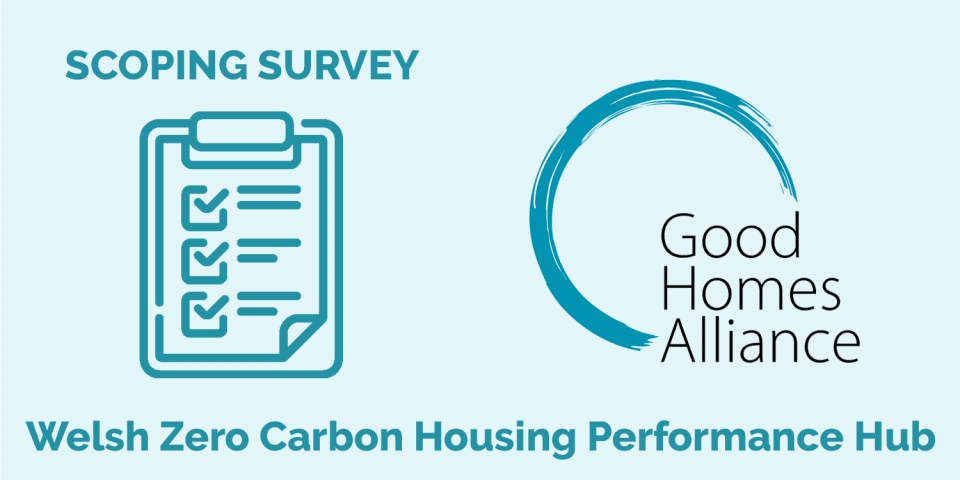Collaboration
The Building Performance Network is very pleased to have begun working alongside the Good Homes Alliance (GHA) and Woodknowledge Wales to deliver an important scoping study for a Welsh Zero Carbon Housing Performance Hub.
The context – The journey to net zero in Wales
2019 was an exciting year for Welsh housing energy and carbon policy. In March 2019 the Welsh Government published Prosperity for All: A Low Carbon Wales stressing that “if Wales is to meet its climate targets, buildings will need to operate at close to zero emissions by 2050.” (see low-carbon-delivery-plan_1.pdf – gov.wales).
This was followed soon after in April, with the Independent Review of Affordable Housing Supply, Chaired by Lynn Pamment. The Panel recommended “that all affordable homes should be near zero carbon / EPC ‘A’ using a fabric first approach from 2021, with the same goal being set for all homes irrespective of tenure by 2025.” (see independent-review-of-affordable-housing-supply-report_0.pdf – gov.wales). And this recommendation is now being consulted on by the Welsh Government as part of the proposed Mandatory Quality Standards for New Homes (Mandatory quality standards for new homes – gov.wales).
Then in July 2019 the Decarbonisation of Homes in Wales Advisory Group published their report Better Homes, Better Wales, Better World – Decarbonising Existing Homes in Wales, the culmination of a major review commissioned by the Welsh Government. The Chair, Christopher Jofeh noted in the foreword, “there is real appetite across all parts of Welsh society to tackle the climate emergency. It is right that Wales takes a lead on this issue.”
One of the recommendations, Action 1.3, was that “no later than 2025, all new homes in Wales must be built to be low carbon, energy and water efficient and climate resilient…All homes built with public sector funding should meet these standards no later than 2021.” The report also highlighted that “requiring higher build standards is not enough. Long standing performance gap issues must be addressed urgently and this will require, among other things, an effective, independent building control system.” (see Independent review on decarbonising Welsh homes: report – gov.wales).
And then of course, in late 2019, the Welsh Government began its consultation on proposals to tighten building regulation requirements governing the energy and carbon performance of new build housing. It is anticipated that ”an average semi-detached home built to meet the Part L 2025 Standard would produce 75-80% less carbon dioxide emissions than one built to the 2014 Part L requirement.” (see consultation-document-building-regulations-part-l-review.pdf – gov.wales).
Lastly, and of direct relevance to this survey, a report published in April 2019 by Woodknowledge Wales, funded by the Welsh Government called Zero Carbon Homes: Actions to Integrate our Welsh Forest Industries with Modern Methods of Construction made 15 key recommendations regarding the integration of the Welsh forest industry’s supply chain with off-site timber construction. One action is to “Establish a building performance hub to support the transition to regulations aligned to performance-based outcomes rather than design requirements.” (see zero-carbon-homes-from-wood-2019-English.pdf – woodknowledge.wales).
It is clear from this body of work that Wales has impressive ambitions for its housing stock and is looking to make concerted progress on the delivery of low energy and zero carbon homes, linking this to wider benefits for health, well-being and the economy.
About this scoping study
In order to support these critical objectives, North Wales housing association, ClwydAlyn, secured funding from the Welsh Government to explore the potential to establish a “Zero Carbon Housing Performance Hub” in Wales – a provisional name. The scoping study is being carried out by the Good Homes Alliance (GHA) in collaboration with Woodknowledge Wales and the Building Performance Network.
This survey is the first opportunity to feed into early-stage thinking about the potential role of the Hub, how it should be structured, and how it should operate. We envisage it taking approximately 30 minutes to complete, depending on how many comments you wish to make. The anonymised results will inform a scoping report due to be published in Spring 2021.
We welcome the views of all interested parties by 5 March 2021 and envisage there being further opportunities to take part in the scoping work in the coming year.
| TAKE THE SURVEY |

